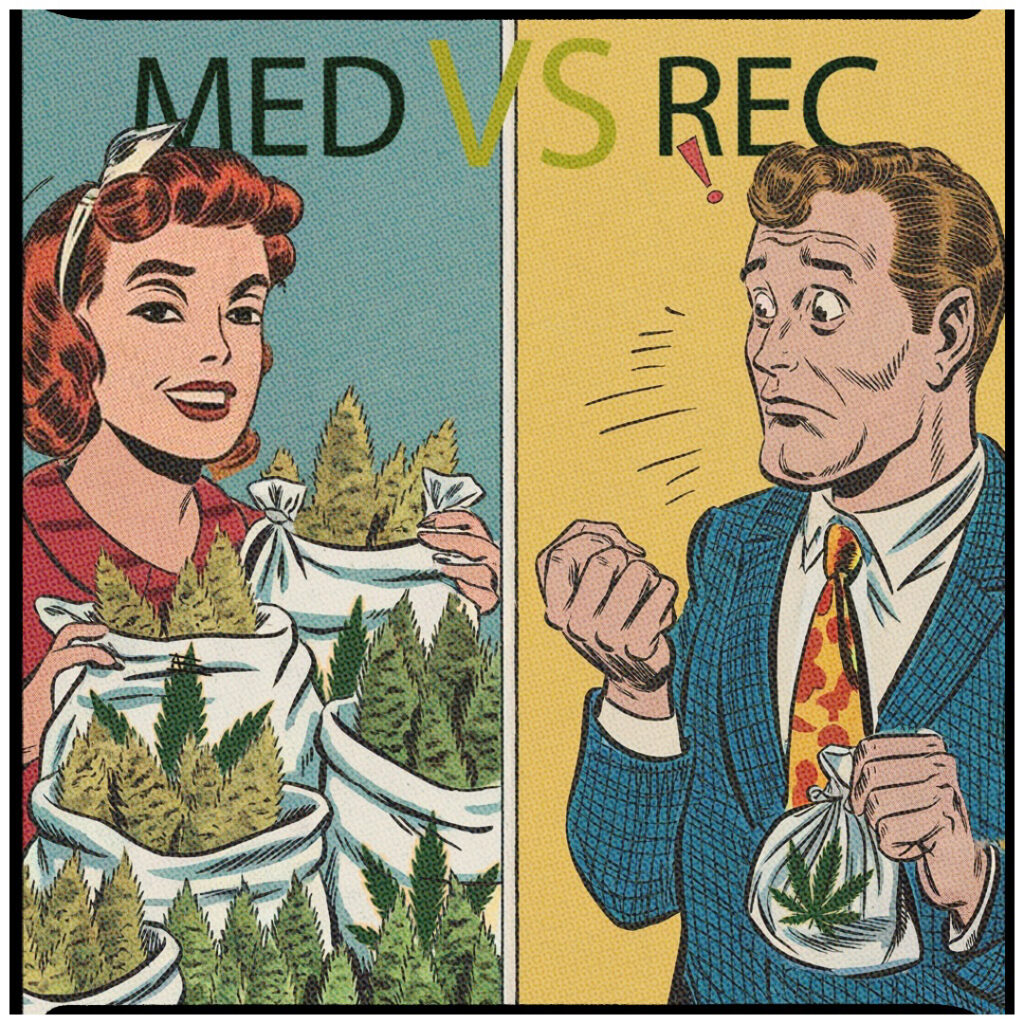Explore the key differences between recreational and medical marijuana in Arizona, including costs, legal benefits, and accessibility, to determine if getting a medical marijuana card is still worth it.
Arizona’s cannabis market has undergone a dramatic transformation over the past decade. With the passage of Proposition 207 in 2020, recreational marijuana became legal for adults 21 and older in January 2021. While this was a major milestone, medical marijuana has been legal in the state since 2010 under Proposition 203, which established the Arizona Medical Marijuana Act.
With recreational cannabis now widely available, many consumers are questioning whether obtaining a medical marijuana card is still worth the time, effort, and cost. While recreational use offers convenience, medical marijuana patients continue to enjoy a variety of benefits, including legal protections, tax savings, and access to stronger products. Here’s a closer look at the key differences between medical and recreational marijuana in Arizona to help determine which path might be right for you.
Legal Framework
Medical Marijuana
Arizona’s medical marijuana program was established under Proposition 203, allowing patients with qualifying conditions to legally purchase and use cannabis. To obtain a medical marijuana card, patients must be diagnosed with a condition such as chronic pain, PTSD, cancer, or epilepsy. The application process involves a physician’s recommendation, state registration, and a card issuance fee.
Recreational Marijuana
Under Proposition 207, Arizona residents 21 and older can legally possess and consume cannabis. The law allows for possession of up to one ounce of marijuana, with no more than five grams of concentrate. Home cultivation is permitted, but with limitations: individuals can grow up to six plants per person, with a maximum of 12 plants per household. Consumption remains illegal in public places, and driving under the influence carries legal consequences.
Cost Analysis
Medical Marijuana Costs
Obtaining a medical marijuana card requires an upfront investment. The Arizona Department of Health Services (ADHS) charges a $150 application fee, with renewals required every two years. However, cardholders benefit from a 16% excise tax exemption, making cannabis purchases significantly cheaper in the long run.
Recreational Marijuana Costs
Recreational users pay a 16% excise tax on top of Arizona’s standard 5.6% sales tax, making total tax rates exceed 21% per purchase. While avoiding the medical card application process may seem convenient, frequent cannabis users often find that tax savings alone make getting a medical marijuana card financially beneficial.
Purchase and Dosage Limits
Medical Marijuana
Medical patients can purchase up to 2.5 ounces of cannabis every two weeks with no restrictions on THC content in edibles. This provides access to higher-dose products that can be more effective for managing chronic conditions.
Recreational Marijuana
Recreational users face stricter limits, with purchases capped at one ounce every two weeks. Additionally, THC content in edibles is limited to 100mg per package, with 10mg per serving, restricting higher-dose options available to medical patients.
Accessibility and Availability
Medical Marijuana
Cardholders gain access to a wider variety of high-potency products, including concentrates and edibles tailored to specific medical needs. Additionally, some dispensaries offer patient-only hours and exclusive discounts, ensuring medical patients receive priority service.
Recreational Marijuana
While recreational cannabis is available at licensed dispensaries statewide, selection is often more limited compared to medical offerings. Products are restricted by potency caps, and some dispensaries reserve premium strains and concentrates for medical marijuana card holders.
Legal Protections and Benefits
Medical Marijuana
Medical marijuana patients receive additional legal protections, including employment safeguards that prevent discrimination based on medical cannabis use (except in federally regulated jobs). Patients who live more than 25 miles from a dispensary can also cultivate up to 12 plants at home for personal use.
Recreational Marijuana
While recreational use is legal, employment protections do not extend to recreational users, and businesses can still enforce drug-free workplace policies. Public consumption remains illegal, and home cultivation is capped at six plants per person, with a maximum of 12 per household regardless of distance from a dispensary.
Health and Safety Considerations
Medical Marijuana
Medical cannabis is designed for therapeutic use, with physician guidance on dosage and strain selection. Patients benefit from specialized products that address chronic pain, nausea, and other qualifying conditions, minimizing adverse effects through personalized treatment plans.
Recreational Marijuana
While cannabis offers general wellness benefits, recreational users often lack medical oversight, increasing the risk of improper dosing or overconsumption. Edible products, in particular, can pose risks due to delayed onset and varying individual tolerance levels.
Social and Cultural Impact
Medical Marijuana
The acceptance of medical cannabis has played a crucial role in reducing the stigma around marijuana use. It has provided a legitimate alternative for pain management, helping many patients reduce reliance on pharmaceuticals, including opioids.
Recreational Marijuana
The legalization of recreational marijuana has accelerated mainstream acceptance, significantly expanding the industry and creating economic opportunities. Cannabis has also become a more prominent feature of social events and festivals, further integrating it into daily life.
While recreational marijuana offers accessibility and convenience, medical patients continue to benefit from lower costs, higher purchase limits, and stronger legal protections. Medical cannabis remains the preferred option for those who rely on marijuana for chronic pain management and other qualifying conditions.
For those who use cannabis regularly, obtaining a medical marijuana card can lead to significant savings and expanded product options. Whether for health benefits, financial advantages, or legal protections, the medical marijuana program continues to provide substantial value. As Arizona’s cannabis laws evolve, staying informed about the latest regulations can help consumers make the best decision for their needs.
If you are interested in obtaining your medical marijuana card, be sure to make an appointment with the Marijuana Doctor, and start saving today!

***
GreenPharms is more than just a dispensary. We are a family-owned and operated company that cultivates, processes, and sells high-quality cannabis products in Arizona. Whether you are looking for medical or recreational marijuana, we have something for everyone. From flower, edibles, concentrates, and topicals, to accessories, apparel, and education, we offer a wide range of marijuana strains, products and services to suit your needs and preferences. Our friendly and knowledgeable staff are always ready to assist you and answer any questions you may have. Visit our dispensaries in Mesa and Flagstaff, or shop online and get your order delivered to your door. At GreenPharms, we are cultivating a different kind of care.







